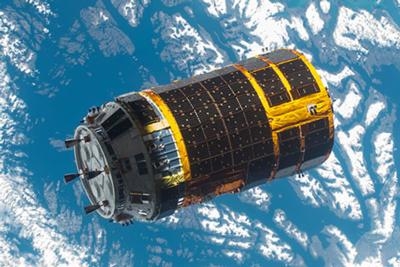Wed, Jun 05, 2019
The Spacecraft Will Provide Supplies To The Kibo Japanese Experiment Module And The International Space Station For Future Servicing Missions
Sierra Nevada Corporation (SNC), has teamed with the Marubun Corporation of Tokyo, Japan and has been awarded a contract to supply critical hardware for Japan’s HTV-X cargo spacecraft.

HTV-X is the advanced version of H-II Transfer Vehicle (HTV) (pictured). The spacecraft will provide supplies to the Kibo Japanese Experiment Module and the International Space Station for future servicing missions.
The HTV-X spacecraft is developed and operated by the Japanese Aerospace Exploration Agency (JAXA), with primary sections of the vehicle being manufactured by Mitsubishi Heavy Industries (MHI) and Mitsubishi Electric Corporation (MELCO).
“SNC is proud to service the space station in any capacity, and our services for the HTV-X vehicle show a great partnership between international and U.S. companies. We are happy to help with any space exploration and science in low-Earth orbit,” said Bryan Helgesen, senior director business development for SNC’s Space Systems business area.
SNC has provided thousands of devices on hundreds of space missions for more than three decades, including more than eight sets of HTV cargo pallet restraint mechanisms, and more than 15 sets of CYGNUS cargo vehicle Passive Common Berthing Mechanisms and External / Visual Ranging Cue systems. For HTV-X, SNC will be able to leverage this extensive flight heritage and once again supply multiple key technologies.
HTV-X Mission Hardware Highlights:
HTV-X External / Visual Ranging Cue System:
- Navigation lights activated on-orbit and prior to robotic arm deployment to assist in guiding the vehicle safely berth it to the space station.
- Passive Common Berthing Mechanism:
- The PCBM is a mechanical and structural interface required to safely and reliably attach a spacecraft to the space station.
Hatch Kit:
- Allows astronauts to enter the vehicle and retrieve critical supplies, payloads and experiments.
Internal lighting system:
- State-of-the-art solid-state lighting technology used to provide efficient mass and power solutions for navigation, crew and astronaut task lighting. This new technology replaces outdated fluorescent tubes.
Cabin pressure sensor:
- Unique sensor design suitable for the rigors of space flight while maintaining precision accuracy in monitoring atmospheric pressure inside the pressurized spacecraft (or HTV-X Cargo vehicle).
HTV-X exact launch dates are still to be determined.
(Source: Sierra Nevada Corporation news release. H-II Transfer Vehicle pictured in JAXA image)
More News
Airplane Bounced About 3 Ft Then Touched Back Down And Then, With No Brakes Applied, The Airplane Began Veering To The Left Analysis: The pilot entered the airport traffic pattern >[...]
Aero Linx: British Microlight Aircraft Association (BMAA) The primary focus within all aviation activity is SAFETY. In all aspects of our sport SAFETY must come first, whether it b>[...]
From SnF25 (YouTube Edition): William Wynne Builds Practical Aircraft Engines on the Corvair Platform Seeking an affordable alternative to the traditional aircraft engine options, >[...]
How To Get A Story On Aero-TV News/Feature Programming How do I submit a story idea or lead to Aero-TV? If you would like to submit a story idea or lead, please contact Jim Campbel>[...]
From 2023 (YouTube Edition): Bridge of CiES CiES Inc. is a Bend, Oregon-based designer and manufacturer of modular embedded aircraft systems and sensors. The company’s fuel-l>[...]
 NTSB Final Report: Aviat A1
NTSB Final Report: Aviat A1 ANN's Daily Aero-Linx (07.08.25)
ANN's Daily Aero-Linx (07.08.25) Classic Aero-TV: Fly Corvairs Reliable Engine Alternative
Classic Aero-TV: Fly Corvairs Reliable Engine Alternative ANN FAQ: Contributing To Aero-TV
ANN FAQ: Contributing To Aero-TV Classic Aero-TV: CiES Fuel-Quantity and e-Throttle Systems Praised
Classic Aero-TV: CiES Fuel-Quantity and e-Throttle Systems Praised



